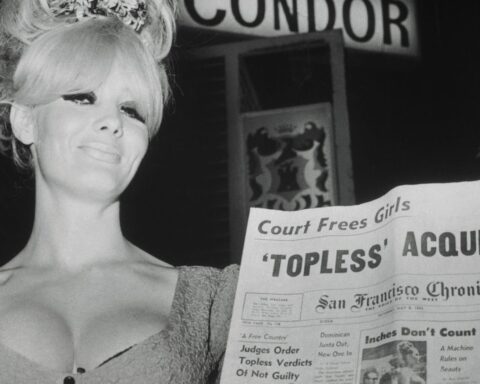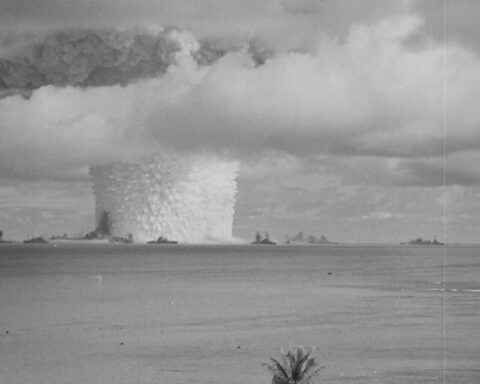Watergate
(USA, 260 min.)
Dir. Charles Ferguson
“Never be petty. Always remember others may hate you but those who hate you don’t win unless you hate them. And then you destroy yourself,” said former President Richard Nixon in his farewell speech to the White House Cabinet and staff.
Director Charles Ferguson, who won an Oscar for his outstanding look at the financial crisis Inside Job, offers this clip of Nixon at the end of his four-and-a-half hour marathon of a documentary about the Watergate scandal. Although the sheer volume of evidence Ferguson presents in Watergate proves (again) that Nixon was a crook who abused his power and violated the Constitution he swore to protect, the doc somehow makes one feel sympathetic for Tricky Dick after he accepts defeat in a long drawn-out battle with Congress and the judiciary. Watergate – Or: How We Learned to Stop an Out of Control President is a multi-faceted, if completely exhausting, glimpse into the Nixon administration, its perverted power struggles, and the will of the American people to hold their nation to a higher standard than its Chief Executive.
Nixon’s farewell speech is the screw that makes Watergate relevant when so much has already been said about the scandal in which Republican goons broke into the Democratic National Convention at the Watergate Hotel, bungled a burglary, and inspired years of political cover-ups, trials, and pre-impeachment proceedings. Ferguson’s doc leaves little doubt that Nixon was a criminal, and a pretty sloppy one too, and the doc makes one wonder what good the former President could have done with his time in office had it not been disproportionately occupied with petty personal grievances and damage control. There’s a lesson to be learned—or two, if one counts the fact that Nixon probably should have just burned the tapes—since the President’s distrust of the Democrats, the media, Vietnam protesters, and virtually everyone outside of his inner circle fueled hateful politics of distrust that stalled civil progress. Sound familiar?
Watergate Is especially relevant as the pettiest of crooked scumbags (south of Ontario) holds political office this very day. Ferguson never utters the T-word during Watergate and he doesn’t have to. The current gong show in the USA has too many parallels with the Watergate scandal to ignore. Nixon’s sense of entitlement and his belief that the Presidency was above the law remains eerily prescient as the present Oval Office is more akin to a Mafioso meeting place than a room for elected leaders to conduct business.
Ferguson provides an in-depth look at the Watergate affair to suggest that those who fail to learn from history are inevitably bound to repeat it. The doc is most impressive with the access that Ferguson gets to the parties who lived this chapter of history. Virtually all the key living players, save for Henry Kissinger, appear for an interview in Watergate. New conversations with journalists Bob Woodard, Carl Bernstein, Lesley Stahl, and Dan Rather speak to the madness of covering the affair and illuminate Nixon’s war with the media. (Thankfully, he didn’t have Twitter.) Pat Buchanan takes credit for fuelling Nixon’s distrust of the press, while Ferguson’s interviews with Nixon’s former counsel John Dean, who provided especially damaging testimony during the Watergate hearings, are particularly revealing. There are hours upon hours of interviews in Watergate if one counts the mix of new material and archival footage, which is both the film’s remarkable coup and its downfall. Ferguson presents an information overload that is undeniably fascinating, but also mentally exhausting due to the sheer volume of information it delivers.
The archival elements display a meticulous level of care during research and production as Ferguson culls together a variety of sources to create a dynamic web of coverage. The film tackles the Watergate affair from all angles as it presents one bombshell after another. Watergate catches Nixon as a victim of his own making as it dexterously edits together images of the man himself as he loses his grip on his integrity while refusing to acknowledge any wrongdoing on his behalf.
The film also spices things up with dramatic interpretations of the recordings of meetings between Nixon and his co-conspirators in the Oval Office. While these elements are redundant to an extent, especially since they frequently repeat lines while transitioning from archive to drama, they help Watergate avoid being too dry an exercise in dense historical reportage. Douglas Hodge plays Nixon with ample spit-spewing gusto and captures his emboldened sense of power as it spirals out of control. (Although he looks nothing like Nixon, while his co-stars have little resemblance to their counterparts.) The film is especially gripping as Ferguson recounts the duel between the Nixon administration and the special prosecutors of the grand jury hearings over the aforementioned tapes. Even without Nixon present to reflect upon his mistake, the film conveys how he doomed himself in the court of public opinion and alienated numerous allies with his dogged refusal to give up the fight.
The final act, however, makes good on the info dump that precedes it as Ferguson looks to the impeachment hearings as members of the House of Representatives debate the case against Nixon. By this time, Nixon’s guilt was already obvious, so the images and interviews Ferguson provides illustrate the necessity to see the President within the limits of his power and the honour of his position. The fight is not about taking down a President, but preserving the integrity of the Constitution he (or, one day, she) defends. The parallels to today are too obvious to ignore with Nixon’s “I am not a crook” line likening itself to Trump’s “NO COLLUSION ! [sic]” tweets and with former House of Representatives member Elizabeth Holtzman’s passion to hold the USA to a higher standard enduring in the spirit of Alexandria Ocasio-Cortez. Watergate doesn’t tell audiences what to do if the President is a career criminal, but it certainly conveys the stakes in letting him walk free.
Watergate opens at Hot Docs Ted Rogers Cinema on Friday, June 14.
It screens in two parts, with options for the full four-hour show.











